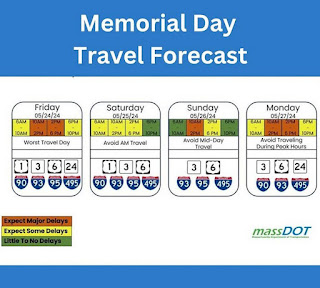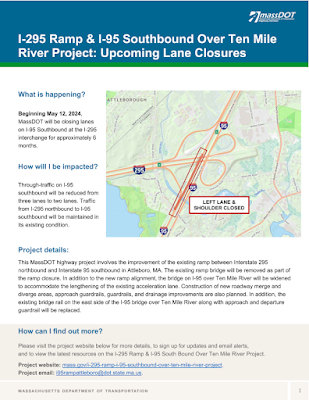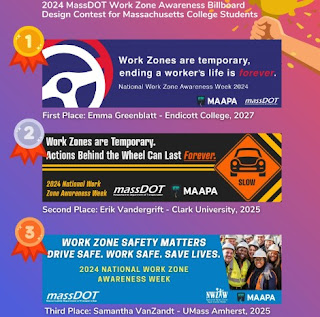Ahead of its upcoming 15-year anniversary, the Massachusetts Department of Transportation (MassDOT) is pleased to announce that the final Beyond Mobility plan document, executive summary, and appendices have been posted to the Beyond Mobility website at the following link: www.mass.gov/beyond-mobility.
“We are excited to share the final version of the Beyond Mobility plan, which is responsive to the extensive public feedback we heard throughout this multiyear process,” said Transportation Secretary and CEO Monica Tibbits-Nutt. “This plan will go on to restructure several recurring planning processes and shape new planning efforts at MassDOT to ensure that all of our work is reflective of the transportation needs of all our residents, today and for many years into the future.”
Considered the Massachusetts 2050 Transportation Plan, Beyond Mobility serves as a blueprint for guiding transportation decision making and investments in Massachusetts in a way that advances MassDOT’s goals and maximizes the equity and resiliency of the transportation system. The project team, considering what the world will be like in 2050, has analyzed previous plans, public engagement responses, and results from a needs assessment and has identified six key priority areas of Massachusetts to focus on over the long term. These are: safety, destination connectivity, travel experience, reliability, supporting clean transportation, and resiliency. Within the Plan, vision statements, values, problem statements, and over 100 action items have been developed and are organized by these six priority areas.
“Our roads and bridges are crucial lifelines for our communities. It is essential that we leverage every available tool to ensure safety, reliability, and resilience in our transportation infrastructure,” said Highway Administrator Jonathan Gulliver. “Implementing initiatives such as Beyond Mobility is vital to anticipate and address future challenges effectively. The decisions and investments we make now will shape our lives in 2050.”
Beyond Mobility - Final Report video from MassDOT on Vimeo.
“Our passenger and freight rail system and regional transit networks are essential in keeping our state’s economy competitive,” said Rail and Transit Administrator Meredith Slesinger said. “Rail and transit’s role in enhancing our quality of life across Massachusetts will only continue to grow. Beyond Mobility lays out a comprehensive plan for expanding and funding these services where they are most needed, and for continuing to make the zero-emission bus fleet transition so we can support our state’s climate goals.”
“Breakthroughs in Advanced Air Mobility, such as electric crewed and uncrewed aircraft, are empowering aviation to move people and goods in a way that’s greener, cleaner, quieter, and more versatile while collecting aerial data that can help optimize the maintenance and safety of transportation infrastructure,” said Aeronautics Administrator Jeff DeCarlo. “Through the Beyond Mobility Plan, we look forward to leveraging these innovative technologies across all domains to help build a cleaner, more efficient multimodal transportation network.”
 |
| MassDOT Unveils Final Plan for Beyond Mobility, the Massachusetts 2050 Transportation Plan |
“The Beyond Mobility Plan provides excellent guidance for the next 25 years, so we can continue to identify our opportunities to the benefit of everyone who travels in the state,” said Registrar of Motor Vehicles Colleen Ogilvie. “The Plan will help us take steps accordingly so we can optimize our operations and customer service tools.”
The 60-day public comment period for Beyond Mobility began on April 1, 2024 and closed on May 31, 2024. During the public comment period, more than 500 individual comments were received and analyzed by the project team for potential incorporation into the final plan document. Comments were categorized into individual themes, and MassDOT will provide responses to each theme. The full list of comments and MassDOT responses has been posted to the plan website as Appendix E.
“It is obvious that a substantial amount of effort has been expended by MassDOT staff to prepare a document that accurately captures the current conditions, needs and desires of residents,” said Thomas Matuszko, Executive Director of the Berkshire Regional Planning Commission. “This plan has great potential as a transportation policy document, as it establishes a strategic framework with priorities to improve the Commonwealth’s transportation system over the next 25 years.”
“The Beyond Mobility plan is a significant step forward in integrating transportation infrastructure with cultural and environmental preservation,” said Melissa (Harding) Ferretti, Chairwoman of the Herring Pond Wampanoag Tribe. “By considering ferry services and culturally significant pathways, MassDOT has shown a commitment to respecting and incorporating the needs and values of our community. We are excited about the potential for future collaborations that prioritize sustainability and inclusivity.”
UMass Lowell Chancellor Julie Chen said, “In Lowell, we see an incredible opportunity for enhanced collaboration and coordination between the city, university, MBTA, Regional Transit Authorities serving the region, and the private sector, as demonstrated by the Lowell INC project. We are confident that Lowell can serve as a replicable and scalable model for other communities to follow as we look to collectively implement the goals of Beyond Mobility.”
Kimberly Robinson, Executive Director of the Pioneer Valley Planning Commission, said, “The Beyond Mobility document does an excellent job defining the Commonwealth’s vision for advancement and improvement of the transportation system.”
Jason Palitsch, Executive Director of the 495/MetroWest Partnership, said, “The reliability, or lack thereof, of the transportation network across the Commonwealth and in the 495/MetroWest region acts as a deterrent for the use of public transportation options beyond single-occupancy vehicle commuting. The Beyond Mobility Plan reinforces this sentiment by stating that Massachusetts travelers of any mode experience congestion, resulting in low confidence about the conditions they will encounter and diminished access to everyday needs. The Partnership greatly appreciates the effort of MassDOT to prioritize locations within the roadway network that are prone to bottlenecks and delays.”
Caitlin Allen-Connelly, Senior Advisor on Transportation at A Better City, said, “Our region cannot survive let alone thrive without a safe, reliable, equitable, and sustainable transportation system. The Beyond Mobility priority areas—safety, reliability, support of clean transportation, destination connectivity, resiliency, and travel experience—reflect this and support an urgent need to move beyond the status quo. We applaud the Commonwealth for embracing new approaches to address the ongoing challenges that threaten our shared vision of a more equitable, affordable, and competitive region, and we encourage the use of strong metrics to hold us accountable.”
The launch of Beyond Mobility’s public comment period earlier this year was part of a coordinated effort by MassDOT titled “MassDOT@15,” to both commemorate the 15th anniversary of MassDOT on November 1, 2024, and look to the future of transportation in Massachusetts. Beyond Mobility is the blueprint for transportation decision making and prioritization and is one of three major policy and strategy efforts associated with MassDOT@15. The other two are the Healey-Driscoll Administration’s Transportation Funding Task Force and the MassDOT Strategic Business Plan. These three strategy components – Beyond Mobility, the Transportation Funding Task Force, and the Strategic Business Plan – will outline who we are, what we do, and how we pay for it and will be aligned to the mission, values, and goals of MassDOT.
Download the full plan -> https://www.mass.gov/doc/massdot-beyond-mobility-full-plan/download


















